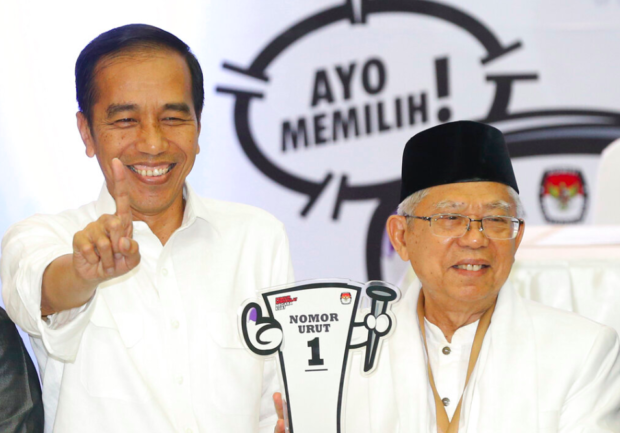
In this Sept. 21, 2018 file photo, Indonesian presidential candidates Joko Widodo (left) and his running mate Ma’ruf Amin, show the ballot number that will represent them in the 2019 presidential election, during a draw at the General Election Commission office in Jakarta, Indonesia. AP
JAKARTA, Indonesia — Opinion surveys two weeks ahead of presidential and legislative elections in the world’s third-largest democracy show Indonesian President Joko Widodo and his ruling coalition maintaining a large lead over the rival camp.
Four nationwide surveys conducted in the second half of March show Widodo between 13 and 20 percentage points ahead of former special forces general Prabowo Subianto, though undecided voters are as high as 20%.
The race has tightened modestly since late last year, but pollsters say Widodo, who has had a commanding lead for months, especially in populous East and Central Java, is headed for victory in the April 17 election.
Widodo, the first Indonesian president from outside the Jakarta elite, has campaigned on progress in upgrading inadequate infrastructure and reducing poverty. He narrowly defeated Subianto in the 2014 president election.
Far behind in the polls, Subianto and his team have recently resorted to questioning the integrity of the upcoming vote, apparently setting the groundwork for a repeat of his unsuccessful challenge to the 2014 results.
Subianto’s ultra-nationalistic campaign has focused on what he sees as Indonesia’s weakness in the world relative to its vast land area rich in natural resources and population of more than 260 million.
He has highlighted significant problems facing the country including poverty and particularly the tragedy of stunting — malnutrition in children younger than 5 that causes lifelong physical and mental impairment.
But the government has been able to show progress in alleviating those long-standing crises.
The UN’s Food and Agriculture Organization and other international agencies said earlier this week that the percentage of Indonesian children suffering from stunting fell to 30.8% from nearly 38% between 2013 and 2018.
During the same period, the reduction in the number of hungry and malnourished people, including children, has come to a standstill in many other parts of Asia, according to the agencies that included UNICEF, the World Health Organization and World Food Program.
Meanwhile, the Pew Research Center, in research released Thursday, said Indonesians are increasingly optimistic about their country’s current and future economic situation.
As of last summer, two thirds of Indonesians said the economy was doing well compared with almost the same number saying it was doing poorly before Widodo was elected in 2014.
The March opinion surveys showed the coalition of parties that has coalesced around Widodo since his election would gain about 60% of the vote compared with 37% for the parties allied with Subianto.
Religion has not figured in the election campaign as prominently as expected in the predominantly Muslim nation. Widodo at least partially neutralized criticism he is insufficiently Muslim by naming a conservative cleric, Ma’ruf Amin, as his running mate.
Personality differences also appear to have worked in Widodo’s favor.
Subianto, an elite figure linked to human rights abuses during the Suharto dictatorship, is a powerful speaker but has often appeared volatile and emotional during the campaign. Widodo has cultivated a friendly common man persona that has roots in his lower middle-class background. /ee